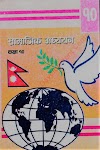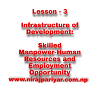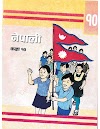.png) |
| Class 10 Social Unit 5 Lesson 7 Election Process |
Lesson-7
Election Process
A. Short answer questions
1. What is an election? Why it is important?
Ans:- Election is a legitimate process in which the voters choose their representatives or participate in the decision making process using their voting rights. It is important to form the government according to the wish of people, to make decisions about future plan, policy and program, to make government responsible to the people, to strengthen and developed a democracy through periodic election and to maintain the legitimacy of government in in National and international level through election.
2. What is meant by electoral system? Give short introduction of the electoral systems being practiced in Nepal at present.
Ans:- electoral system is a method of election which has its own rule of casting votes, counting the votes and giving a final result. Following are the electoral system being practiced in Nepal at present:
a) First Past The Post Electoral System:-
It is an electoral system in which the one who receives more votes than any other candidates get elected. This system is used to elect a single candidate from an election constituency in which voters cast their votes directly to their preferred candidate.
b) Proportional Electoral System:-
It is an electoral system in which the whole countries considered a single constituency. The voters cast their vote to their preferred political party and the percentage of the popular vote won by the party is converted into seats.
3. Write short introduction to the following.
Ans:-
a) Electoral roll:- Electoral roll is an official list off the names and address of the people in a specific area who are entitled to vote in an election. It is updated by the election commission every year and includes the name who attain 18 years of age to ascertain the voting right of people who are Nepalese citizens.
b) Election code of conduct:- It is a set of rules or guidelines issued by the election commission during the election. It should be abided by the candidates, political parties, government, public institutions, employees, mass media, INGOs, observers, etc.
c) Polling station:- It is officially chosen for casting votes during an election. It is also called voting booth. Generally, public places such as school, playground, etc. are chosen as the polling station.
d) Voter identity card:- Voter identity card is needed for casting vote in the election. It includes the name, address, identity card no, Photograph of voter. It is called biometrics voter identity card.
4. What are the qualifications required for the member of Federal Parliament?
Ans:- Person who meet the following requirements are considered eligible to be the candidate for the member of Federal Parliament:
i. Citizen of Nepal.
ii. Has attained 25 years of age for the House of Representative and 35 years of age for the National Assembly.
iii. Has not been punished for any criminal offence involving moral turpitude.
iv. Not ineligible under any law.
v. Not holding an office of profit.
5. Mention the functions of polling officer.
Ans:- The functions of polling officer are listed below:
i. To conduct the election in concerned booth.
ii. To make necessary arrangement of booth.
iii. To arrange security.
iv. To begin and complete the election in scheduled time and with legal process.
v. To give decision on any filed cases and other problem.
B. Long answer questions.
1. What are the bodies to conduct election in Nepal? Write short description of each.
Ans:- The bodies of conduct election in Nepal are as follows:
a) Election Commission:- The Constitution of Nepal has made a provision of Election Commission in part 24. There is a Chief Election Commissioner and four other Commissioners in the election commission. It conducts, supervises, directs and controls the election of the President, the Vice President, Federal Parliament, Provincial Assemblies, local bodies. It also prepares the voters list for the purpose of election.
b) Election officer:- When the date of election is announced, the Election Commission appoints the Election Officers. The Election Officers conduct the election in different election constituencies.
c) Polling officer:- Polling officers are appointed to conduct the election in different polling centres. They have to make necessary arrangement of booth, security management, begin and complete the election in scheduled time and with legal process. They have to stop or postpone the election if needed and make a decision on any filed cases and other problems. They also hold the responsibility to submit the ballot box to concerned authority and if needed count the votes in the local election.
2. The use of Electronic Voting Machines instead of stamping on ballot paper has been started in Nepal
as well. What simplicities is and difficulties may it bring? Write.
Ans:- The use of Electronic Voting Machines instead of stamping on ballot paper has been started in Nepal as well. It may bring following simplicities and difficulties:
Simplicities
i. Saving of printing cost of ballot paper.
ii. They may not be conflict in counting vote.
iii. There is less chance of invalidity of votes.
iv. It makes the voting process fast.
Difficulties
i. It is uneasy to use the machine in the place where there is no electricity.
ii. There is chance of damage of machine during voting.
iii. Difficult to paste the symbols in the key board as there are more numbers of candidates.
iv. It is very difficult for old and illiterate people to use the machine.
3. Some of the countries in the world have made the provision of rejection of vote in these days. It is also known as "None of the above-(NOTA)". Is it appropriate in our context? Why? Give reasons.
Ans:- In the context of Nepal, the provision of None of the above (NOTA) should be included in my opinion. People should be given the right to reject the candidates if they dislike all the candidates. There are many leaders who distribute sweet dream to people to get vote but as they win they do nothing for the sake of people. It has become a trend in the context of Nepal. So this provision is very useful for those voters who like to use voting right but don't like to choose any corrupt candidates.




.png)
.png)



.gif)



0 Comments